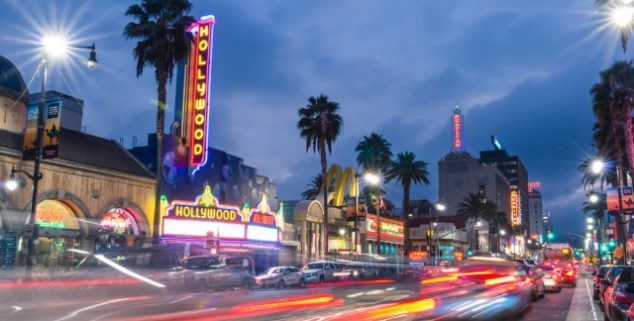Opinion
New nightlife technology protects public
 L.A.'s Hollywood Boulevard by night, an entertainment hub of the city. (Photo: View Apart, via Shutterstock)
L.A.'s Hollywood Boulevard by night, an entertainment hub of the city. (Photo: View Apart, via Shutterstock)Most consumers are all too familiar with signs displayed by small business owners that read, “We reserve the right to deny service to anyone.” Signs once intended to discourage minor infractions are largely obsolete today, especially with the escalation of alcohol-induced violence in bars and nightclubs. Today, alcohol is a leading contributor to sexual and aggravated assault, and homicide.
The simple fact is that 95% of all incidents at nightclubs are caused by 1% of patrons, and vulnerable communities such as women targeted for harassment and assault may bear the brunt of these episodes.
Sacramento and other jurisdictions are mandating new technology that scans drivers’ licenses as patrons enter nightclubs and other select drinking establishments.
In addition, bars and nightclubs have historically been an important gathering place and refuge for members of the LGBT community, where unfortunately they are often targeted for violent hate crimes such as the 2016 shooting at Pulse nightclub in Orlando Florida that claimed at least 50 lives.
For far too long, entertainment and restaurant venues would try to protect their guests and employees by recording the names of violence-prone patrons in a spiral notepad, an archaic practice that never really worked in practice.
Just as new technology has replaced 8-track tapes and rotary phones, a manager’s spiral notebook is finally being replaced with new technology.
The City of Sacramento and other jurisdictions have recognized this reality by mandating new technology that scans drivers’ licenses as patrons enter nightclubs and other select drinking establishments. The scanners flag fake I.D.s of under-aged drinkers and allow notations (like a spiral notebook) to be made on patrons who have consistently exhibited acts of physical or sexual assault, destruction of property or threatened violence.
As a powerful prevention tool, the information can be shared with other users of the technology, like a neighboring nightclub. When IDs are scanned at the door, the kiosk alerts managers to monitor patrons who may have exhibited inappropriate behavior in their nightclub in the past or even in another establishment, and under extraordinary circumstances they can be denied entrance.
LGBTQ establishments in Sacramento and many other parts of the state and country are using this technology to help assure that their patrons are safe at their establishments, because they can identify at the door individuals who may have engaged in violent conduct at other establishments, including anti-LGBTQ conduct.
Despite the technology’s obvious public safety benefits, it is also important that any technology that collects data on individuals be subject to consumer protections.
Even though the software never had the ability to conduct criminal background checks or collect highly sensitive information like credit card or social security numbers, Assemblyman Jim Cooper of Elk Grove authored legislation (AB 2769) to limit the use of ID-scanning technology to critical purposes such as verifying age and preventing fraud, abuse, or material misrepresentation.
As a former Sacramento County deputy sheriff, Cooper recognizes the importance business owners place on protecting their patrons and employees. It takes only one fateful incident to take a life, bankrupt a business and tarnish a neighborhood’s reputation.
Women, LGBTQ and all patrons deserve a safe refuge when they enter a bar or nightclub. It is for this reason that organizations representing crime victims and the LGBT community believe that Cooper has struck the right balance to both protect consumer privacy and at the same time ensure that this technology’s benefits are preserved to protect the public’s safety.
Since this technology has prevented and solved numerous cases of violent and sexual assault against women and members of the LGBTQ community, this technology is an important component to assuring the safety of our communities.
—
Editor’s Note: Rick Zbur is the executive director of Equality California. Harriet Salarno is chair and co-founder of Crime Victims United of California.
Want to see more stories like this? Sign up for The Roundup, the free daily newsletter about California politics from the editors of Capitol Weekly. Stay up to date on the news you need to know.
Sign up below, then look for a confirmation email in your inbox.

We agree 100%. We like that we can ban a trouble maker and no one misses it.